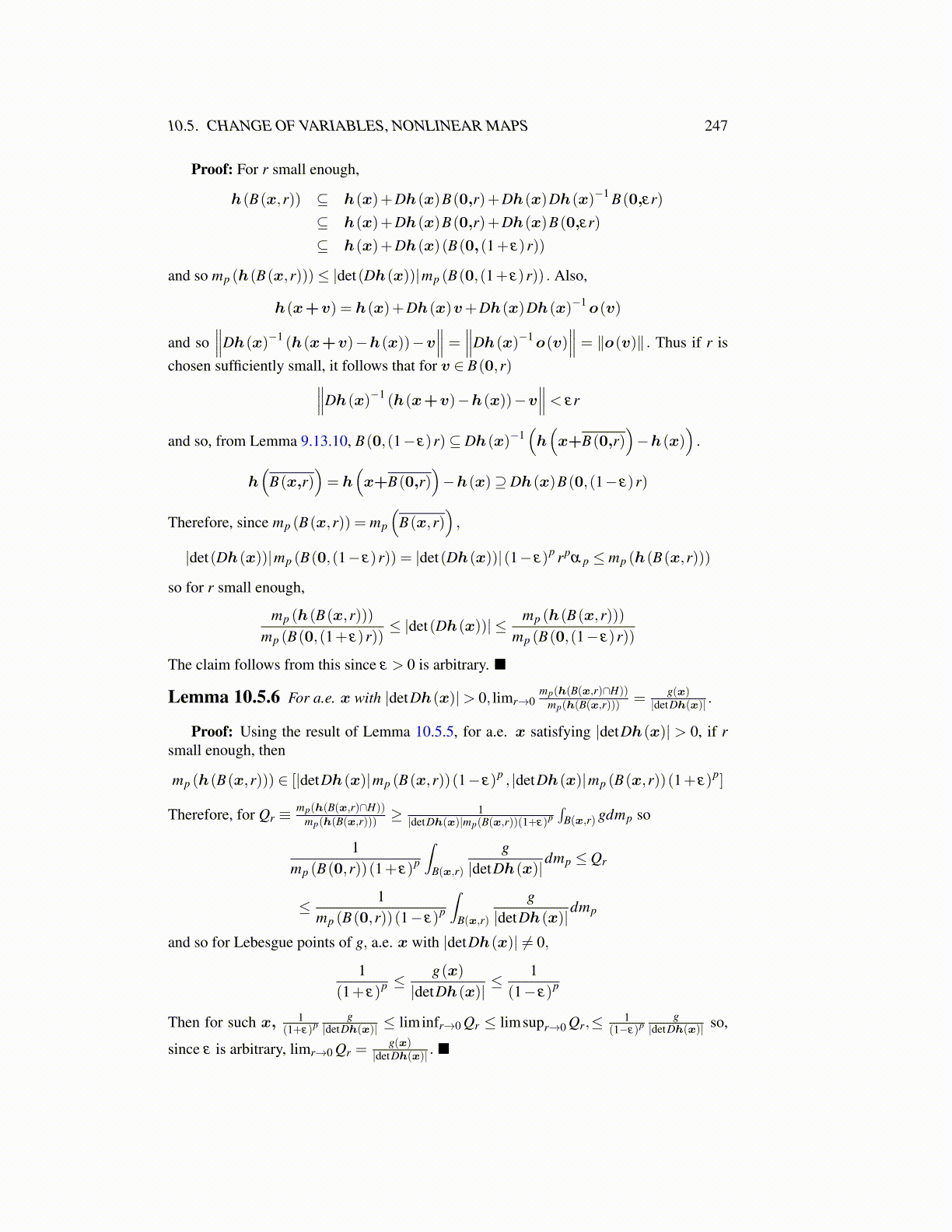
10.5. CHANGE OF VARIABLES, NONLINEAR MAPS 247
Proof: For r small enough,
h(B(x,r)) ⊆ h(x)+Dh(x)B(0,r)+Dh(x)Dh(x)−1 B(0,εr)
⊆ h(x)+Dh(x)B(0,r)+Dh(x)B(0,εr)
⊆ h(x)+Dh(x)(B(0,(1+ ε)r))
and so mp (h(B(x,r)))≤ |det(Dh(x))|mp (B(0,(1+ ε)r)) . Also,
h(x+v) = h(x)+Dh(x)v+Dh(x)Dh(x)−1o(v)
and so∥∥∥Dh(x)−1 (h(x+v)−h(x))−v
∥∥∥ = ∥∥∥Dh(x)−1o(v)∥∥∥ = ∥o(v)∥ . Thus if r is
chosen sufficiently small, it follows that for v ∈ B(0,r)∥∥∥Dh(x)−1 (h(x+v)−h(x))−v∥∥∥< εr
and so, from Lemma 9.13.10, B(0,(1− ε)r)⊆ Dh(x)−1(h(x+B(0,r)
)−h(x)
).
h(
B(x,r))= h
(x+B(0,r)
)−h(x)⊇ Dh(x)B(0,(1− ε)r)
Therefore, since mp (B(x,r)) = mp
(B(x,r)
),
|det(Dh(x))|mp (B(0,(1− ε)r)) = |det(Dh(x))|(1− ε)p rpα p ≤ mp (h(B(x,r)))
so for r small enough,
mp (h(B(x,r)))mp (B(0,(1+ ε)r))
≤ |det(Dh(x))| ≤mp (h(B(x,r)))
mp (B(0,(1− ε)r))
The claim follows from this since ε > 0 is arbitrary. ■
Lemma 10.5.6 For a.e. x with |detDh(x)|> 0, limr→0mp(h(B(x,r)∩H))
mp(h(B(x,r)))= g(x)|detDh(x)| .
Proof: Using the result of Lemma 10.5.5, for a.e. x satisfying |detDh(x)| > 0, if rsmall enough, then
mp (h(B(x,r))) ∈ [|detDh(x)|mp (B(x,r))(1− ε)p , |detDh(x)|mp (B(x,r))(1+ ε)p]
Therefore, for Qr ≡mp(h(B(x,r)∩H))
mp(h(B(x,r)))≥ 1|detDh(x)|mp(B(x,r))(1+ε)p
∫B(x,r) gdmp so
1mp (B(0,r))(1+ ε)p
∫B(x,r)
g|detDh(x)|
dmp ≤ Qr
≤ 1mp (B(0,r))(1− ε)p
∫B(x,r)
g|detDh(x)|
dmp
and so for Lebesgue points of g, a.e. x with |detDh(x)| ̸= 0,
1(1+ ε)p ≤
g(x)|detDh(x)|
≤ 1(1− ε)p
Then for such x, 1(1+ε)p
g|detDh(x)| ≤ liminfr→0 Qr ≤ limsupr→0 Qr,≤ 1
(1−ε)pg
|detDh(x)| so,
since ε is arbitrary, limr→0 Qr =g(x)
|detDh(x)| . ■